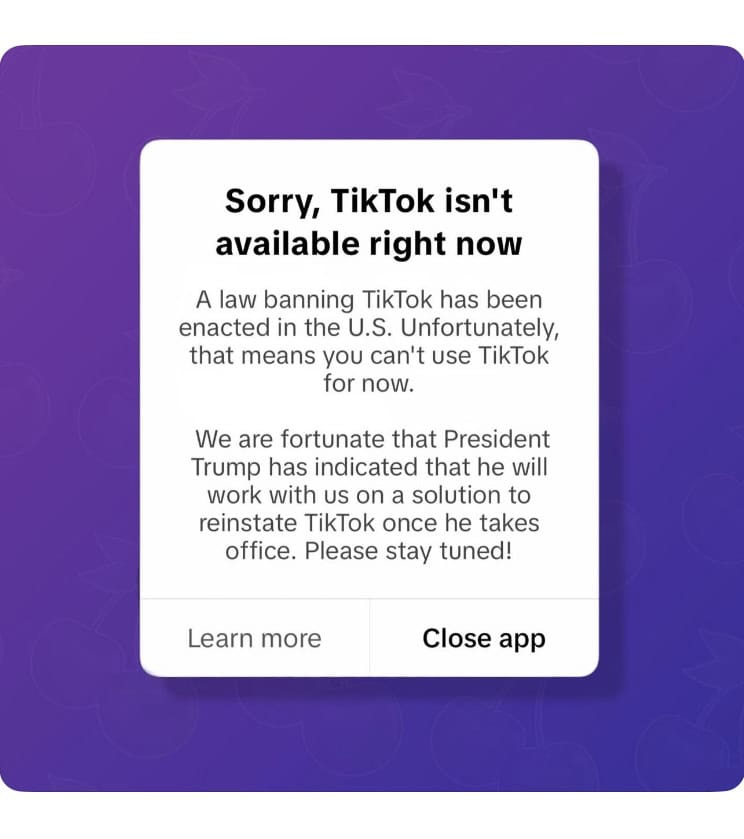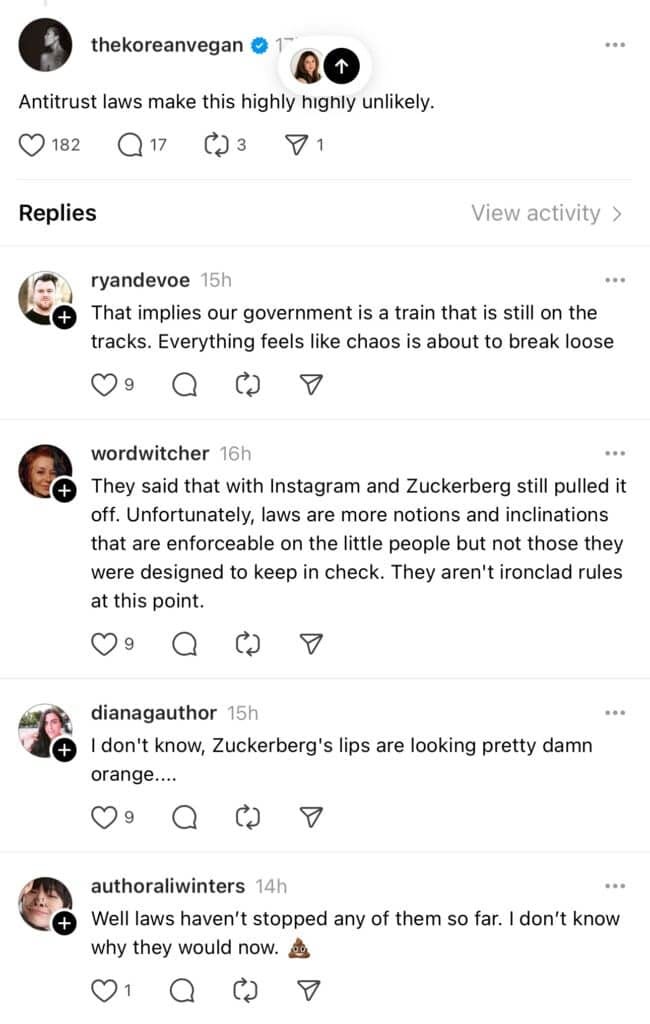Do laws even matter anymore?
The TikTok Ban, Meta buying TikTok, and what it all means for our Republic.
It’s been a whirlwind of activity in Casa Molinaro the past week. Yes, we are back home, largely back in the groove, and this morning, we even had a bit of rain. I’ve never in my entire life been so relieved to see the tiny, shallow puddles collecting on our patio. I want to thank all of you who reached out to me last week to check in on our safety. For some reason, though, they all went to my spambox (weird!) and I didn’t see them until yesterday, so please excuse my delay in replying (I will!).
During the evacuation, while staying at our friends’ home, I actually had to get ready for interviews with BBC News and CBC News. They’d seen a clip of my chat with CNN on the forthcoming TikTok ban and they wanted to have me weigh in as both a content creator and a lawyer. I was wearing a grungy white tank top and sweatpants when I showed up at our temporary retreat and hadn’t brushed my hair in two days. I certainly hadn’t thought to include a suit jacket and makeup when I packed my “go-bag.” My friend graciously lent me a navy blazer to wear over my tank top and I bought some makeup from CVS, makeup I applied while sitting on the carpeted floor of our friends’ eldest teenage son’s bedroom.
Despite having to give one of the interviews on that floor with my laptop propped up on the bed, microphone clutched in my hands, it went pretty well. It felt nice to put my lawyer hat on to give my read on the situation. At that time, the Supreme Court hadn’t yet weighed in with a decision, but, after listening to snippets of the oral arguments, it seemed unlikely TikTok would find any judicial reprieve.
I can guess that many of you are rolling your eyes. Who cares about a bunch of influencers with their strange and probably inappropriate gyrations on an app that is gift-wrapping all our data for the PRC? Let’s set to one side whether or not TikTok merits your interest (TikTok is thought to be responsible for $24 billion added to the US GDP, 224,000 jobs in just 2023 alone, as well as host to 7 million small businesses, but, I digress…). We can also shelve for another day (or never) how much I sobbed while sitting on my couch on Saturday evening, reading through all the comments young people left on my final video (which apparently wasn’t very final at all–most of us are now back on the app) about how much I’d helped them over the years.
What I find interesting, fascinating, and also a little alarming is the overt lawlessness of it all. As we all learned in social studies class, our government is divided into three branches: legislative, judicial, and executive. The TikTok Ban was signed into law by a bipartisan Congress (legislative). The law gave the President (executive) until January 19, 2025 (i.e., the Biden Administration) to certify to Congress that a sale of TikTok to a US-owned company was in the works and therefore, an extension was warranted. No such certification was made (nor could it have been, unless our President decided to, like, lie). The US Supreme Court (judicial) issued a unanimous opinion thwarting any constitutional challenges to the TikTok Ban. All three branches of government have weighed in and all three have cemented the Ban as The Law of the Land.
And yet, here I am. On January 19, having just posted a TikTok video, after which I “hearted” a chorus of comments singing, “We’re BAAAAAACCCCCKKKKK.”
How did we get here?
I’m not an insider with access to the political maneuverings that take place on the Hill, but I can say, legally, this doesn’t work. I’ve read the statute, backwards and forwards, multiple times. No one could legally save TikTok once SCOTUS issued its decision, unless of course, he lied.
And I guess that’s a good enough segue into what I’m trying to describe–a public breakdown in integrity.
I often see the phrase “flouting the plain language of the law” in legal briefs (which usually prompts an immediate eye-roll), but can there be a more perfect phrase to describe what is currently happening? By the time you are reading this email, the new U.S. President will have signed an executive order purporting to “delay” the ban for a set period of time and pundits and influencers alike are wondering whether it was all just a massive PR stunt.
Say what you want about whether the law is a good one, a fair one, or a constitutional one (I have lots of thoughts on this), but it is still a law that’s been through all the checks and balances of our system of government. And yet, two Presidents–Joe Biden and Donald Trump–have publicly declared that they have no intention of enforcing The Law of the Land. Not only is this a complete slap in the face to the other two branches of government (I mean, if I’m one of the justices, I’ve gotta be like, “Ok so why did I just RUIN my New Year’s holiday for all this CRAP!?”), it signals to all of us that laws are not actually, well, laws. At least not in the way we probably think of them.
Either there’s a fundamental infirmity in the way these laws come to be or there’s an alarming loophole that can pull the rug out from what has already been demonstrated to be a fragile democracy. Or both.
Can our Republic afford to fall flat on its face?
Adding to the “something about this feels a little off” vibes was the outgoing message that hundreds of millions of users (myself included) received when trying to log onto TikTok after the ban slid into effect:
“We are fortunate that President Trump has indicated that he will work with us on a solution to reinstate TikTok once he takes office. Please stay tuned!”
Whut.
Did I just hallucinate?
Did TikTok just publicly put the executive branch of the U.S. government on the hook to save its a$$, which would essentially require an end-run on the law as the first order of business in the Oval Office?
Earlier this morning (Sunday, at the time I was writing this email), the message was replaced with a much more generic one, saying that TikTok was “temporarily unavailable,” and, like I said, access to TikTok has already been restored to many U.S. users. When that access was restored, the message was updated once more to read: “As a result of President Trump’s efforts, TikTok is back in the U.S.!”
Obviously, these messages have many users (like me) questioning what, exactly, has been saved…?
My guess is that between both presidential administrations’ commitment to ignoring the law, a substantial debit from Trump’s political capital vis-a-vis China (“did I mention I want to tariff you to the hills?”), and a Congress scrambling to mold itself around the incoming administration (we’ve already seen many Republicans back-pedaling on the ban–Senator Jim Jordan loosely alluded to working with Trump on a potential repeal or amendment of the law), the Law of the Land has about as much weight as the sheet of paper it was printed on.
Perhaps less.
Why does this matter?
Well, swirling around were rumors that TikTok had been secretly sold to Meta (the U.S.-based parent company to Facebook and Instagram). Conspiracy netizens pointed to the fact that Facebook was suddenly advising users that they could link their TikTok profile to their Facebook accounts (this feature has actually been around for a while). Instagram completely changed the appearance of their hallmark grid, replacing the familiar square (which had been around for DECADES) with the rectangle (the dimensions of a short form vertical video). As someone who spent the second half of her career defending class action antitrust lawsuits and DOJ proceedings aimed at preventing my clients’ acquisitions, I noted that such a sale was highly unlikely. The replies I received were… enlightening:
“Well laws haven’t stopped any of them so far. I don’t know why they would now.”
“We are not a nation of laws anymore, clearly.”
“That implies our government is a train that is still on the tracks. Everything feels like chaos is about to break loose.”
And:
“Do laws matter anymore?”
While I think we are still a ways off from a complete repeal of the Sherman Act, I am more than a little bit worried about what all this spells for our country, for our people’s faith in our government and the integrity of the custodians of power. While the erosion we’ve witnessed over the past decade might make this a “no surprise” to many, that doesn’t automatically somehow render it “no biggie.”
In the past month, I’ve watched the news coming out of my parents’ homeland, South Korea, the historically stupid move by President Yoon: instituting martial law as a last ditch effort to corral the opposition party, leading to his arrest and unprecedented political upheaval. In case you didn’t know already, South Korea’s republic experienced a massive and agonizing growth spurt in the 1980s, when a military coup resulted in the death of 144 civilians. Many people in South Korea can still remember watching children killed by soldiers enforcing martial law and would gladly storm the streets to ensure nothing like that ever happens again. I remind myself, over and over again, Compared to the U.S., South Korea’s republic is very young. It’s still in its toddler stage, still learning to walk on its two legs without falling over.
But watching the throngs of Korean protesters, ordinary men and women who were, once more, willing to sacrifice their safety and autonomy to ensure the sanctity of their democracy, the sturdy bulwark against lawlessness… well.
It made me wonder whether the U.S. still has a lot to learn about what it means to build a republic worth saving.







